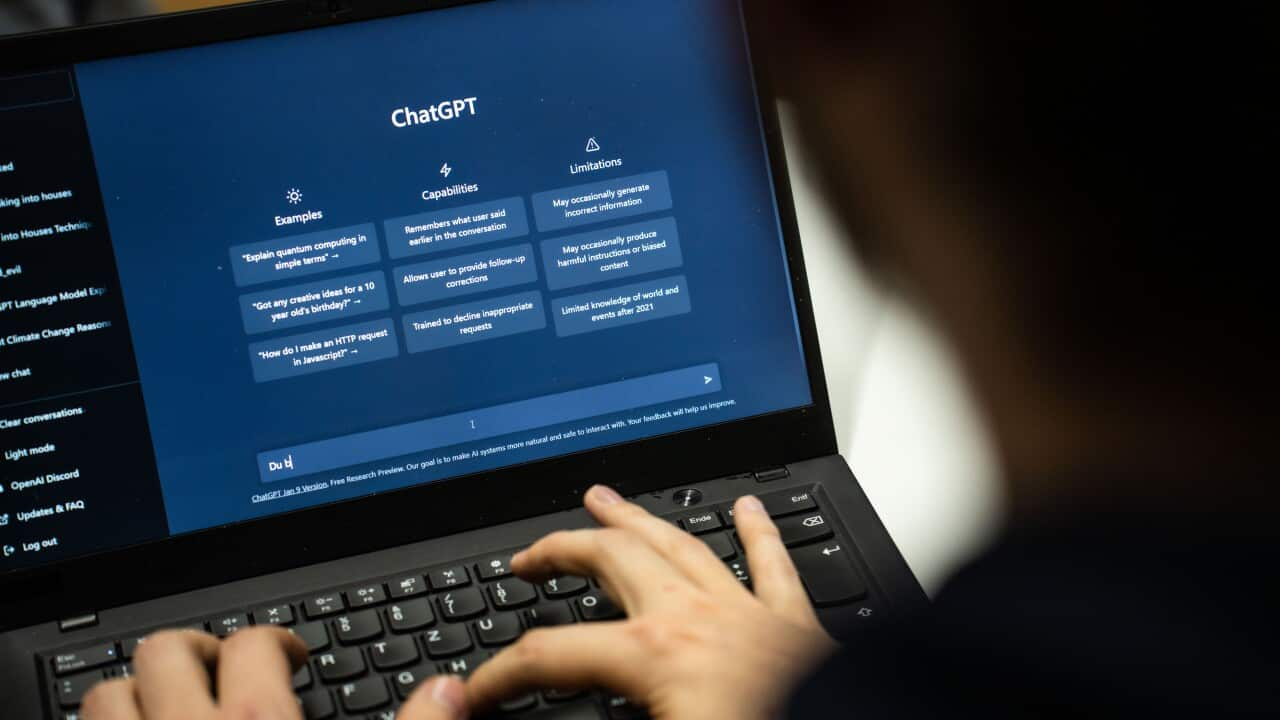Key Points
- The use of AI tools like ChatGPT in creating job applications is a growing trend.
- Gen Z and Millennials say they use it more than Gen X and Baby Boomers.
- Recruiters can often tell if a candidate has used AI in their job application.
Tech-savvy Millennials and Gen Zers are now using generative artificial intelligence to help write their job applications.
AI-generated job applications are flooding recruiters' desks and human resource experts say the trend is here to stay.
Who's sending AI-generated job applications?
Global job site Indeed conducted a survey of working Australians aged 18-64 to study the trend of job seekers preparing applications using generative AI tools such ChatGPT.
Forty-six per cent of the respondents said they had recently used generative AI for preparing their applications.

"Indeed’s survey findings suggest AI tools have the ability to significantly boost success rates for job seekers," Sally McKibbin, career expert at Indeed, told SBS News.
A majority of the respondents (82 per cent) said they would consider using AI in a future job search.
The survey also found younger generations prefer to use generative AI tools such as ChatGPT to apply for jobs.
"As for who’s using it the most, Indeed’s survey found Gen Z and Millennials are the most avid users of AI when job seeking (55 per cent and 54 per cent respectively), compared to 36 per cent for Gen X and 26 per cent for Baby Boomers," McKibbin said.
Men (52 per cent) are more likely than women (40 per cent) to use it.
How do recruiters detect the use of AI?
McKibbin said when generative AI is used well it can be very hard to detect.
However, with close consideration and a critical eye, experienced recruiters know when AI has been used in applications.
Here are some telltale signs, according to McKibbin:
US spelling: Many generative AI tools such as ChatGPT automatically use US spelling. For example, the word organisation spelled as organization.
Lack of personalisation: Generic language or a lack of personal touch are key signs an applicant has used AI to apply for a role.

Excessive buzzwords: When used without substantial context, words such as innovative, dynamic, results-oriented, synergistic, transformational, or results-oriented may indicate AI-generated text.
Unfocused objectives: Career objectives generated by AI tend to be overly broad or vague, lacking a clear, specific direction that aligns with the job on offer.
Anecdotal evidence: The absence of personal stories or concrete examples that highlight achievements and skills can show that an applicant has relied heavily on AI.
How do jobseekers use AI to their advantage?
The survey revealed the most common use of AI among job hunters was tailoring an application to a specific role, with 44 per cent of the 1004 respondents saying they used it for this purpose.
Drafting or formatting an application came in next (39 per cent), preparing responses to potential interview questions (35 per cent), or researching companies that align with personal goals, values and aspirations (34 per cent).

How do human resource experts view this trend?
Professor Herman Tse, who teaches business management at Monash University, said AI can be a useful job-hunting tool.
"If you’re serious about a job, you’d seek time and advice from a mentor or a friend to prepare your application or responses to an interview. In this day and age, it might not be an option for many, that’s where tools like ChatGPT come in. They become the sounding board that some jobhunters don’t have or find inconvenient due to their schedules or location," he said.
He said recruiting agencies now also use AI tools to screen job applications.
"It’s working both ways in the industry. It expands the talent pool as it shortlists more candidates with suitable skills than human beings can and speeds up the process," Tse said.
While he adds this trend is gaining traction, he also highlights its potential drawbacks.
"Over-reliance on AI can be detrimental for jobseekers because they may skip steps for introspection or self-assessment as required by the selection criteria of a job. Some candidates can exaggerate or fabricate their skills only to impress the recruiters. This raises ethical concerns," Tse said.
Tse also warned against breach of data privacy if candidates leave their personal details on an Open Source AI platform.












